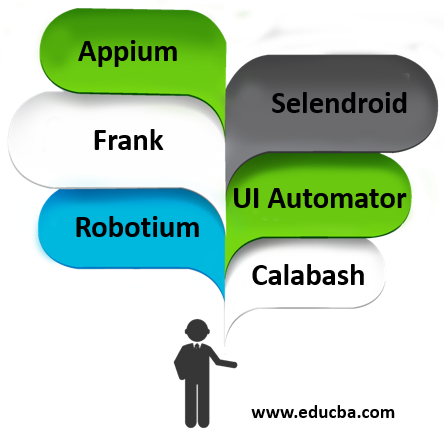Updated March 20, 2023

Introduction to Mobile Automation Testing
Mobile automation is generally done in mobile application testing to improve the efficiency of our testing process. Mobile application testing is an absolute necessity in our current scenario because a lot of applications are being developed as we speak to ease our pain, for example, we depend on applications like Swiggy, Uber, Instagram, WhatsApp, etc. on a daily basis for survival. To maintain the brand, revenue, and quality of the application we need to have a proper testing strategy in place so that the application is brought into good shape before it reaches the market.
What is Mobile Automation Testing?
To test the web applications or mobile applications manually it would require a lot of effort and time, as the technology progress we don’t have that much time in testing these manually and hence we go for this automation testing whereby it reduces the manual effort and we can do this with the help of tools available in the market.
Mobile automation testing helps in some of the critical challenges that are faced in the mobile testing domain such as:
- A huge number of devices (laptops, mobiles, tablets, etc.).
- Dealing with various software (dealing with different versions of IOS and android) and hardware (involving different memory, CPU and OS optimizations).
- Frequent mobile application updates.
- Cost of deploying manual test engineers to carry out the task.
How Mobile Automation Testing is Done?
Mobile automation testing is generally carried out with the help of various tools that are available in the market, where few of them being paid tools and few being open source.
Let us have a look at some of the most commonly used tools in the field of mobile automation testing:
1. Appium
This is an open-source tool that is available in the market which can be used in testing hybrid applications, natives, etc. It also supports almost all platforms such as Firefox, Mac, Windows, Android, etc. Since Appium can run the applications on all the emulators this makes the tool cross-platform automation testing. The main principle of Appium is that the codebase should always be reusable in various platforms. Hence this tool is very much useful in automation testing of ios and android applications and also for the applications that can be accessed via a mobile browser.
2. Frank
This tool helps in writing acceptance tests in a structured manner and it also has an application inspector called a symbiote.
3. Robotium
This automation testing framework is mainly targeted for the android audience, this is similar to the selenium tool but it focuses only on android applications. With this tool, integration becomes much easier and the scripts can be executed in an emulator as well as devices. The major disadvantage with the tool is scalability, i.e. the tests can be executed on one device at a time.
4. Selendroid
This automation framework tool helps in overcoming the disadvantage we faced in the Robotium tool. It not only scales well we can also do parallel testing. Testing is written and carried out in Selenium 2 client API. This also is majorly developed for Android so the test can run on both emulators and real devices.
5. UI Automator
It helps in testing the user interface by creating various functional test cases and these test cases will run on AUT (application under test) on more than one device.
6. Calabash
This is a behavior-driven development automation framework where the acceptance test is written and executed for both android and IOS. Execution can be done on devices as well.
Working of Automation Testing
Now that we learned about various tools involved in mobile automation testing, let us understand how automation testing works. To do automation testing first a framework will be created on testing standards (some of the common frameworks are data-driven and keyword-driven). In the case of a data-driven automation framework, the software developers will be creating scripts that will work on multiple datasets that also cover a wide variety of test cases with a minimal number of scripts.
In the case of keyword-driven framework the automation tested does not need to know any specific language, the scripts will be created completely based on keywords and in tabular formats for execution. To carry out automated testing various tools in the market, the most popular ones are selenium, UFT, etc. for these tools the languages that need to be known are C#, Java, Python, and VB scripting.
Benefits
Given below are the benefits mentioned:
- Provides Faster Feedback: When we are dealing with various phases in a software project, automation testing makes the testing life much easier and it also provides higher efficiency.
- Faster Results: We do save a lot of time when we move from manual testing to automation and automation testing also helps in performing rigorous regression on various applications.
- Cost: Of course, a lot of money is saved; instead of spending a lot of multiple manual resources, we spend less in acquiring license for various tools.
- Test Coverage: By writing test scripts we would be able to achieve a higher coverage which in turn helps in testing more features in the application.
- Reusability of Test Cases and Early Findings of Defects.
- Faster Time to Market.
- Overall Testing Efficiency Improved.
Conclusion
From the above article, we saw the importance of mobile automation testing for mobile applications and its various applications and advantages. We also saw that there are varieties of tools available in the market for automation testing of mobile applications. Before we start with the testing we must weigh the pros and cons associated with each tool and then select wisely. Automation testing definitely makes our life simpler and easier.
Recommended Articles
This is a guide to Mobile Automation Testing. Here we discuss what is mobile automation testing and its working along with its benefits. You can also go through our other suggested articles to learn more –

